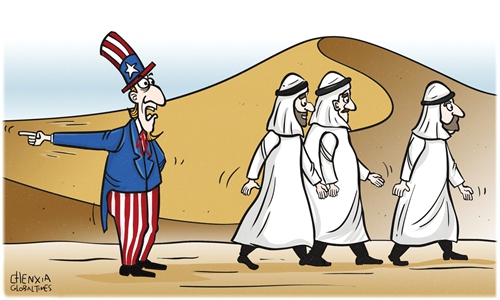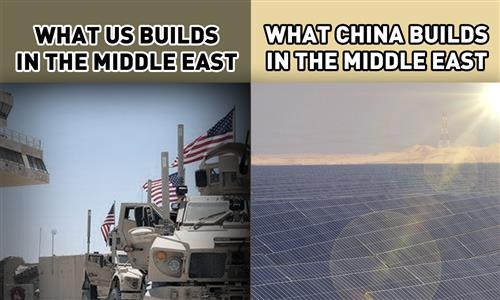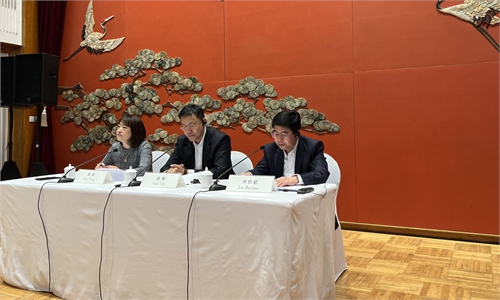
Illustration: Liu Xiangya/Global Times
A recent New York Times report has drawn public attention as it said that the CIA and other US spy agencies warned United Arab Emirates-based artificial intelligence (AI) firm G42 over its cooperation with large Chinese companies that US officials consider "security threats."
If the report is true, the "long arm" of the US disrupting the global AI industry should be cut off. This highlights the urgency of pushing forward global collaboration in AI governance, and establishing new rules in the area to fight against unilateralism, hegemonism and long-arm jurisdiction.
Chinese Foreign Ministry spokesperson Wang Wenbin said at a regular press briefing on Tuesday that he was not aware of the specifics, but he "would like to stress that the US has sabotaged cooperation between Chinese companies and other countries on multiple occasions under hypothetical pretexts, which is economic coercion."
The US has a longstanding practice of exerting long-arm jurisdiction over other countries, trying to maintain US economic hegemony by disrupting global supply chains and containing its competitors, especially those with which it has strained relations. In recent years, the practice has kept expanding in scope, with US' "arms" stretching longer and longer.
AI, a driving force in the new wave of technological revolution and industrial transformation, has the potential to profoundly change the existing international economic and financial landscape. It will come as no surprise if the US plays its old trick of using the national security excuse and long-arm jurisdiction to seek an unfair advantage in the global race and crack down on economically competitive participants.
According to the New York Times report, US officials fear that G42 could be a conduit by which "advanced American technology is siphoned to Chinese companies or the government." Specific situations are unclear but many have put their focus on the fact that G42 is a rapidly growing AI giant. This, to some extent, explains why this report has attracted public attention and discussion, making it easy for people to associate it with strategic competition among major powers and US suppression of Chinese high-tech enterprises.
Last month, G42 announced a partnership with OpenAI, the creator of ChatGPT. The New York Times said that there is a new frontier in the US effort: blunting China's ambitions to gain supremacy in the world's cutting-edge technologies, including AI, big data, quantum computing, cloud computing, surveillance infrastructure and genomic research.
Such moves by the US undermine international economic order and trade rules and threaten the stability of global industry and supply chains. Global governance is facing challenges due to US government's unilateral sanctions, long-arm jurisdiction and ill-intentioned technology war.
AI has significant potential to boost economic growth and productivity, but at the same time it also creates unknown risks to the global economy and human society. If in the field of AI development, some countries are allowed to do whatever they want, promote unilateralism and hegemony, and pursue their selfish interests, then the danger involved will far exceed that of other industries.
The lack of standardized AI norms could see some countries indulge in monopolistic practices and disorderly development, increasing the chances of unilateral action based on misinterpreted intentions as well as economic coercion. So, it is necessary to strengthen global AI governance on a basis of broad consensus among all parties.
A declaration on AI safety was issued earlier this month, under which 28 countries and the EU agreed on the need for a new global effort to ensure AI is developed and used in a safe and responsible way. This is a crucial step, but it will not be the final goal of global efforts in strengthening AI governance.
The China-proposed Global AI Governance Initiative has received positive responses from the international community, as it stresses fairness and justice as core parts of the global AI governing system. With the development of AI, efforts to strengthen governance should continue to advance.
When rules are established step by step, all parties involved - including both developing and developed countries - should be constrained to ensure the healthy development and fair competition of the AI industry, and resist unilateralism and hegemonic behavior.
The author is a reporter with the Global Times. bizopinion@globaltimes.com.cn



